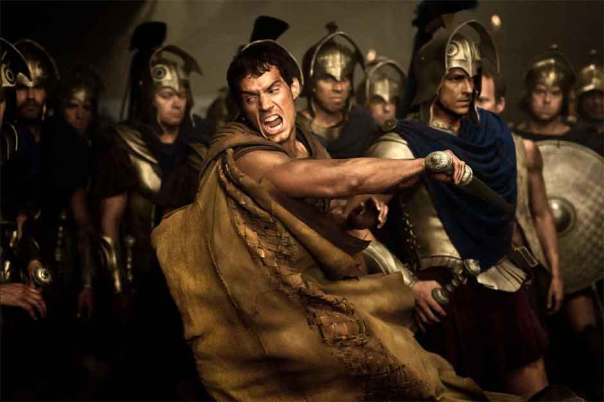Blog Archives
Cinema Sunday (11/13/11)
 Before any of my other obsessions – before U2 and R.E.M. and shoegaze and guitars that jingle-jangle, before the films of Woody Allen and the Coen Brothers, before Cormac McCarthy and Kurt Vonnegut and Stephen King – there was Greek mythology. I was eight years old when my parents took me to see the original Clash of the Titans, and it rocked my prepubescent world to its core (not least because it was the first movie in which I saw my first naked boob).
Before any of my other obsessions – before U2 and R.E.M. and shoegaze and guitars that jingle-jangle, before the films of Woody Allen and the Coen Brothers, before Cormac McCarthy and Kurt Vonnegut and Stephen King – there was Greek mythology. I was eight years old when my parents took me to see the original Clash of the Titans, and it rocked my prepubescent world to its core (not least because it was the first movie in which I saw my first naked boob).
Like most young boys, I was way into stories of adventure. The Empire Strikes Back had come out the year before, and it couldn’t have been much before I saw Titans that my mom took me to see Raiders of the Lost Ark (which is, to this day, still my favorite movie of all time). Titans looks antiquated now, with its Ray Harryhausen stop-motion animation, but it was a revelation at the time, a grand adventure that introduced me to the notion of gods and monsters – Zeus and Poseidon and the kraken and Calibos and the Stygian Witches and, of course, snake-haired Medusa. It was a movie where heroes died and victory was uncertain, and I loved every second of it. I loved it so much that I devoured Alan Dean Foster’s novelization of the movie half a dozen times and became a connoisseur of books about the myths themselves. My favorite was D’Aulaires’ Book of Greek Myths, a cleverly-illustrated volume that recounted the myths in an accessible, kid-friendly way. I couldn’t get enough of it.
So, needless to say, it was sort of hard-wired into my DNA that I’d get excited about a movie that purported to tell the story of Theseus (the Greek hero known for, among other things, defeating the minotaur in the labyrinth). I was even more excited to hear that it would be directed by Tarsem Singh. I’m one of maybe five people on the planet who’s a huge fan of his 2000 Jennifer Lopez -starring creepfest The Cell, and I think his 2006 film The Fall is one of the very best movies of the last ten years. Tarsem is known for his striking, sumptuous visuals, and his first two movies make clear that you’re bound to see things in his work that you’ve never seen before.
 When it comes to my review of the movie, it’s probably most efficient to begin with a quote from Roger Ebert. He says Immortals is “the best-looking awful movie you will ever see.” Unfortunately, he’s absolutely right. But, oh man, the beginning of the movie makes some spectacular promises. The titans, defeated by Zeus and the other gods, are trapped in a cube buried deep inside Mount Tartarus. The movie opens with several shots of this cube – it’s small and unassuming from the exterior, but as we see more of it from different angles, we realize that it’s larger inside than it is outside. Cut to the cube’s interior and we see the captured titans, mud-streaked, yoked in rows with iron rods clamped in their teeth, eyes glazed with anger. It’s a queasy, discomfiting opening, and the scene sets a bar for the rest of the movie that’s so high it’s no wonder it can’t clear it.
When it comes to my review of the movie, it’s probably most efficient to begin with a quote from Roger Ebert. He says Immortals is “the best-looking awful movie you will ever see.” Unfortunately, he’s absolutely right. But, oh man, the beginning of the movie makes some spectacular promises. The titans, defeated by Zeus and the other gods, are trapped in a cube buried deep inside Mount Tartarus. The movie opens with several shots of this cube – it’s small and unassuming from the exterior, but as we see more of it from different angles, we realize that it’s larger inside than it is outside. Cut to the cube’s interior and we see the captured titans, mud-streaked, yoked in rows with iron rods clamped in their teeth, eyes glazed with anger. It’s a queasy, discomfiting opening, and the scene sets a bar for the rest of the movie that’s so high it’s no wonder it can’t clear it.
Much of the problem, it has to be said, rests with the screenplay, and it rests with it on two fronts. As written by Charley and Vlas Parlapanides, Immortals is strangely directionless for at least its first half. After that dynamite opening (which is probably due more to Tarsem’s extraordinary vision than anything else) we’re cast into a classic quest and revenge story, as Theseus (Henry Cavill) attempts to recover the famed Epirus Bow before the cruel King Hyperion (played by a horrifically miscast Mickey Rourke) does, and then kill the king as revenge for murdering a spoiler-free member of his family. This is the stuff of high adventure, and I could imagine it as a rocket-powered story borne along in a runalong rush from high point to high point. Instead we get something weirdly listless, as Theseus and Stavros (Stephen Dorff), accompanied by a couple anonymous buff dudes left over from 300 and the Oracle Phaedra (Slumdog Millionaire‘s Freida Pinto), wander around Greece, doing stuff. There’s very little forward momentum; something happens, and then something else happens, and the two things may or may not have anything to do with each other, but who knows? Things don’t really pick up until the halfway point (or what seemed like the halfway point – parts of this movie felt longer than Roots), which is about the point where Theseus faces the Minotaur and the Epirus Bow becomes an active player in the movie.
 The larger problem – one that ran through the length of the movie and not just 55 of its 110 minutes – is that the dialogue was miserable: stilted, wooden, awkward, phony – am I leaving anything out? Look: I’m not asking for fine literature (I started out by lauding the original Clash of the Titans, fer chrissake), but the words at least need to be serviceable. It’s tempting in a case like this to blame the actors, but really – even Daniel Day-Lewis would have trouble selling a line like, “Let’s write history … with blood!” Cavill and Rourke give it the ol’ college try, but when you’re stuck with characters uttering full-on crapola in a movie that doesn’t seem to be going anywhere, not even Tarsem’s impressive arsenal of visual razzle-dazzle can save it.
The larger problem – one that ran through the length of the movie and not just 55 of its 110 minutes – is that the dialogue was miserable: stilted, wooden, awkward, phony – am I leaving anything out? Look: I’m not asking for fine literature (I started out by lauding the original Clash of the Titans, fer chrissake), but the words at least need to be serviceable. It’s tempting in a case like this to blame the actors, but really – even Daniel Day-Lewis would have trouble selling a line like, “Let’s write history … with blood!” Cavill and Rourke give it the ol’ college try, but when you’re stuck with characters uttering full-on crapola in a movie that doesn’t seem to be going anywhere, not even Tarsem’s impressive arsenal of visual razzle-dazzle can save it.
And it’s a real shame, because that razzle-dazzle is really something else. Villages on the edge of a cliff, the Oracle and her handmaidens drinking from a clear pool, the Minotaur in a helmet seemingly made of barbed wire, the Epirus Bow and its golden arrows, Mount Tartarus, the gods in Olympus, a handful of beautifully choreographed battle scenes, and that introductory scene of the titans – Tarsem is an astounding visual stylist, and it’s no hyperbole to say that the entire movie is a feast for the eyes. But it’s also inert and sloppy, a bunch of beautiful images in need of a story that does them justice.
It’s entirely possible to have a movie without a lot of forward momentum that’s also visually dynamic and that features appealing characters speaking clever and engaging dialogue. I’m thinking specifically of David Gordon Green’s All the Real Girls – one of my all-time faves, which also happens to be a stunningly beautiful film without a conventional plot featuring two of my favorite cinematic characters. It works precisely because all the pieces mesh in service of Green’s singular vision. In Immortals, however, Tarsem has to filter his vision through the inferior script, and the result is more a promise of what could have been than what actually is. 38-year-old Monty was a little disappointed; eight-year-old Monty would be crushed.
*****
Current listening:
Boston Spaceships – Let it Beard (2011)
